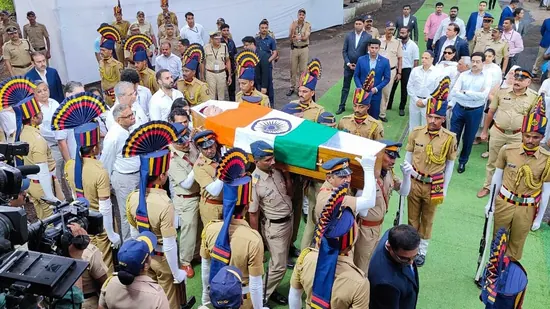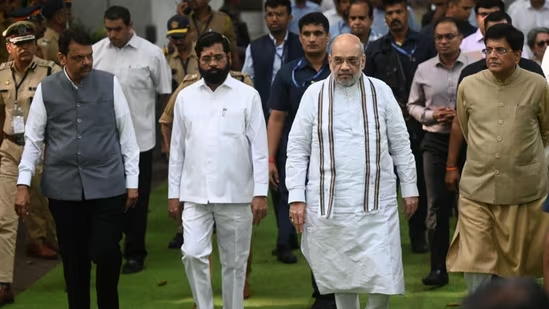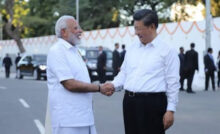Ratan Tata’s final farewell: Nation honours its most revered industrialist and philanthropist | Pics


The final rites of renowned industrialist Ratan Tata were conducted with full state honours at a central Mumbai crematorium on Thursday evening.


The final rites of industrialist and philanthropist Ratan Tata were conducted with full state honours at a central Mumbai crematorium on Thursday evening, following his passing on Wednesday night after a brief illness at a local hospital.(ANI)


A Life of Purpose and Leadership
Ratan Tata, the former chairman of Tata Sons, transformed the Tata Group into a global conglomerate. Under his leadership, the company expanded into numerous sectors, including steel, automobiles, IT, and telecommunications. His vision wasn’t limited to profits but focused on improving lives, making him a true leader with a rare combination of compassion and business acumen.
Born in 1937, Tata served at the helm during key acquisitions like Jaguar Land Rover and Tetley, placing India prominently on the global map. Even after stepping down as chairman, his influence remained steadfast, and his advisory role continued to shape the group’s values and policies.
A Humble Philanthropist and Nation Builder
Ratan Tata believed in giving back to society. Over 60% of Tata Group’s profits are funneled into charitable trusts, which support education, healthcare, rural development, and the environment. Tata Trusts, under his guidance, has played a pivotal role in driving positive change at grassroots levels across India.
He also pioneered efforts in disaster relief and affordable innovation, including launching the Tata Nano, aimed at providing an economical car for families. His empathy towards society was reflected not only in his philanthropic efforts but also in his personal humility—Ratan Tata is known to live a simple, unassuming life despite his immense wealth and influence.
Ratan Tata’s Final Farewell: Nation Honours Its Most Revered Industrialist and Philanthropist
Ratan Tata, one of India’s most beloved industrialists and philanthropists, received a heartwarming farewell as the nation came together to celebrate his unparalleled legacy. As the guiding force behind the Tata Group for decades, his contributions spanned far beyond business success—impacting society, philanthropy, and the spirit of innovation.
A Life of Purpose and Leadership
Ratan Tata, the former chairman of Tata Sons, transformed the Tata Group into a global conglomerate. Under his leadership, the company expanded into numerous sectors, including steel, automobiles, IT, and telecommunications. His vision wasn’t limited to profits but focused on improving lives, making him a true leader with a rare combination of compassion and business acumen.
Born in 1937, Tata served at the helm during key acquisitions like Jaguar Land Rover and Tetley, placing India prominently on the global map. Even after stepping down as chairman, his influence remained steadfast, and his advisory role continued to shape the group’s values and policies.
A Humble Philanthropist and Nation Builder
Ratan Tata believed in giving back to society. Over 60% of Tata Group’s profits are funneled into charitable trusts, which support education, healthcare, rural development, and the environment. Tata Trusts, under his guidance, has played a pivotal role in driving positive change at grassroots levels across India.
He also pioneered efforts in disaster relief and affordable innovation, including launching the Tata Nano, aimed at providing an economical car for families. His empathy towards society was reflected not only in his philanthropic efforts but also in his personal humility—Ratan Tata is known to live a simple, unassuming life despite his immense wealth and influence.
A Tearful Farewell from a Grateful Nation
The news of his farewell triggered a nationwide outpouring of emotions. Leaders from business, politics, and civil society expressed their admiration for Tata, recounting how he touched their lives directly or indirectly. Prime Minister Narendra Modi referred to him as “a beacon of humility and vision,” while industrialists and ordinary citizens alike praised his selflessness and foresight.
Ceremonies and Tributes from All Walks of Life
Tata’s farewell ceremony was simple yet moving, embodying the values he lived by. Schools, community centers, and Tata institutions organized memorials, with children and youth paying tribute through art, poetry, and music. Social media platforms were flooded with emotional messages, highlighting his influence on generations.
Several Tata companies held tribute events, emphasizing the “Tata spirit” that will live on. Employees shared fond memories of their interactions with him, highlighting his hands-on leadership and warmth. “He was not just our chairman—he was family,” remarked an emotional employee.
A Legacy That Will Inspire Generations to Come
Ratan Tata’s legacy transcends business. His life exemplifies that success is not just measured by profits but by the positive impact on society. Even in his farewell, he teaches us to live with purpose, integrity, and kindness.
Though he may step away from public life, his work, spirit, and values will endure through the Tata Group, Tata Trusts, and the countless lives he has touched. The nation bids farewell not just to an industrialist but to a visionary whose heart always beat for the people.
Recent Posts
Stampede during festival at Goa temple leaves at least 6 dead, several injured
Goa Lairai Devi temple stampede: Among the injured, at least 10 people remain in critical condition…
Heavy rain, thunderstorms in Delhi bring respite from heat; IMD sounds alert, flight ops hit
Delhi NCR Weather Update | IMD Red Alert: The weather department had said that a fresh…
At least 14 dead in Kolkata hotel fire, SIT formed to probe cause
Kolkata Hotel Fire News: The fire broke out around 7:30 pm at the Rituraj Hotel,…
Pahalgam attack fallout: Pakistan violates ceasefire; India releases names of 14 ‘active terrorists’ in Kashmir | Full list
Indian soldiers inspect the site in the aftermath of an attack in Pahalgam, about 90kms (55…
Pahalgam guide became guardian angel for Chhattisgarh BJP worker: ‘Hugged the children, saved their lives’
When the attack took place on Tuesday, Agrawal (35) said other tourists pulled him to safety,…
Two terrorists killed in encounter in Baramulla’s Uri day after Pahalgam attack
Indian Army said the encounter broke out on Wednesday with approximately two-three terrorists attempting to infiltrate…


